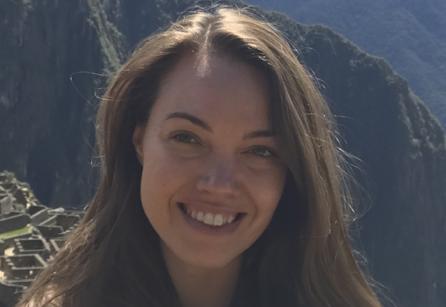News
Rachel Carbonara, PhD Student
September 22, 2021

Rachel Carbonara is a Doctoral Candidate in the Anthropology and Sociology of Religion. She received her MA from the Divinity School in 2016. In the 2021-2022 academic year, Rachel is also a Junior Fellow in the Martin Marty Center for the Public Understanding of Religion, a Fellow at the Chicago Center for Teaching, and a Graduate Community Fellow at the Stevanovich Institute for the Formation of Knowledge. She has previously worked as a Research Fellow on the NPR podcast Invisibilia and is currently Associate Producer of the Harvard Divinity School podcast Ministry of Ideas. Rachel is working with other Ministry of Ideas colleagues on a new series that explores the relationship between religion and science. The series is titled Illuminations, and it is set to be released in 2022.
Rachel’s work examines contemporary energy healing practices in the Americas. It draws upon anthropology, affect theory, and theories of mind in order to better understand alternative healing cultures.
How did you come to be a scholar of religion? What draws you to your research subject?
As an undergraduate, I studied sociology. I became most interested in delving into the underlying frameworks and beliefs about the nature of reality that shaped social norms and dynamics. During my senior year of college, a family friend had gone on a trip to the Peruvian Andes with a school that taught shamanic energy healing and offered me a session when she returned. I had so many questions about this whole phenomenon—ethical, historical, and philosophical questions—that I have pursued it as my central research subject for more than a decade since. This friend was participating in what I would term “spiritual tourism,” and more specifically in a type of spiritual tourism rooted in modern imaginaries of indigeneity. I soon discovered that international networks of shamanic energy healing practice were entangled with Mircea Eliade’s universalizing accounts of shamanism, transnational flows of knowledge and of people across the Americas, colonial dynamics that remain entrenched in the twenty-first century, and traditions of constructing theories which challenge modern materialist ontologies and their corresponding concepts of self and society.
What has been a formative experience you've had as a Divinity School student outside the classroom?
The emphasis on community at the Divinity School has been very important to me as a graduate student. I have benefitted greatly from community events in which I’m able to speak with professors and students from outside of my own subfield. The many student-led clubs and workshops that the Divinity School supports have also been formative to the development of my work. There are so many consistent spaces here for us to form community around our work and exchange ideas.
I have also benefitted from opportunities to engage in public scholarship with the support of the University. Through my career advisor at UChicago GRAD I found about the opportunity to apply to be a Research Fellow for an NPR Podcast, Invisibilia, that explores the underlying forces that shape our societies and our experiences of reality. I have since been able to build on that experience to move into a producer role for a podcast even more aligned with my specific research interests. Working with mixed groups of academic and non-academic professionals who share my interests has been a formative experience for me and for my research. It has required me to articulate similar ideas for both specialists and the general public, a practice which has made my own scholarship stronger.

